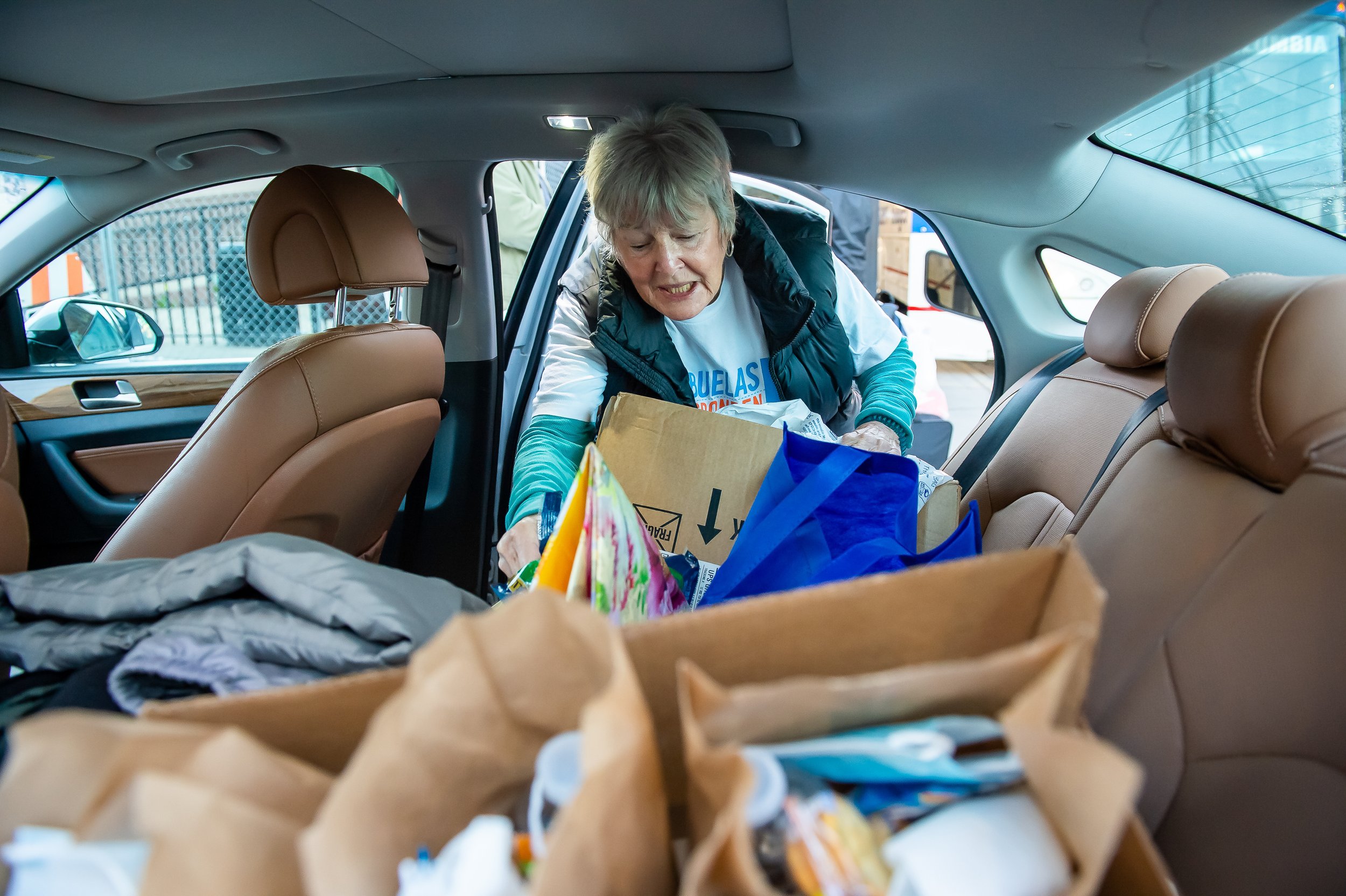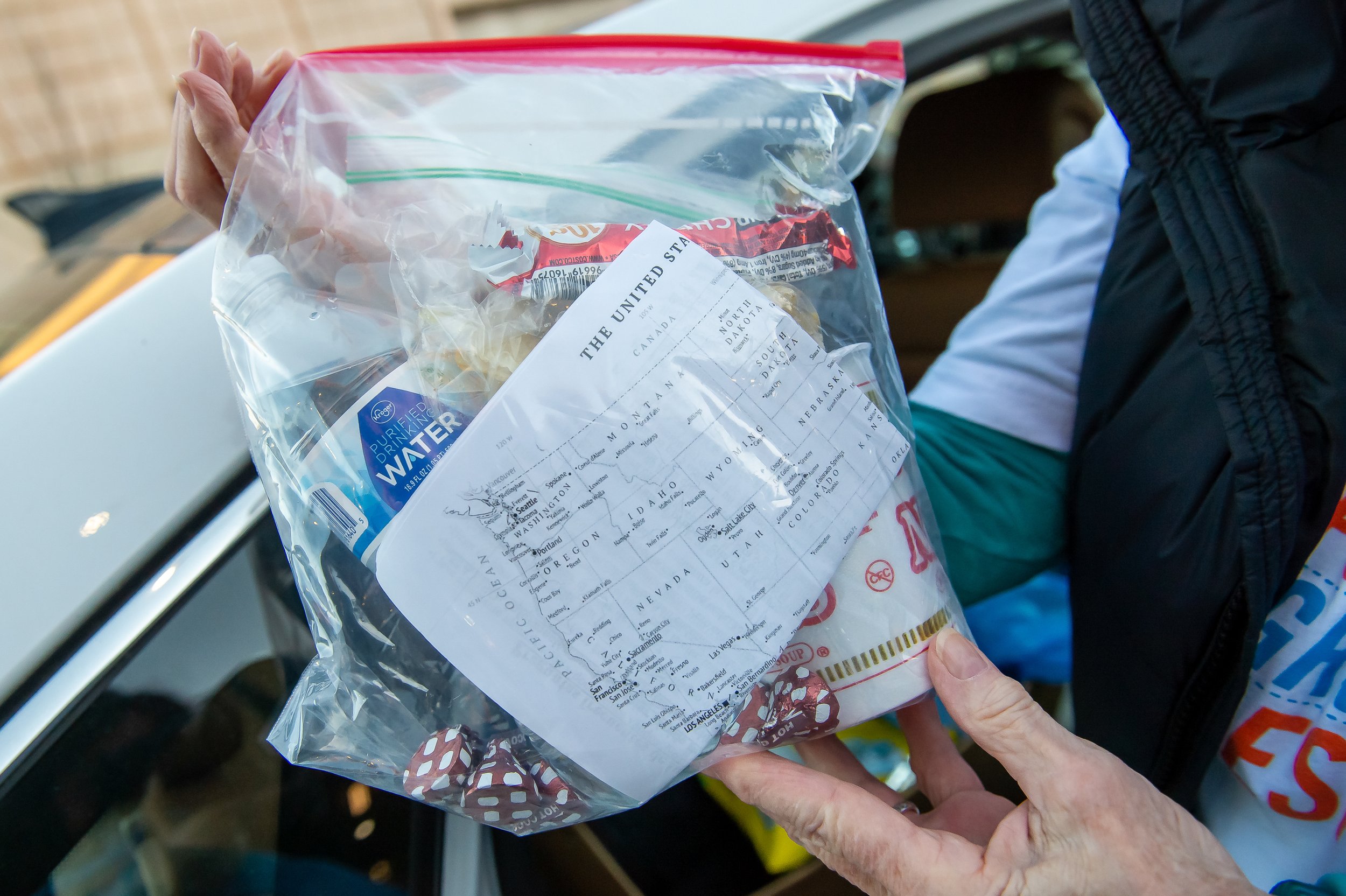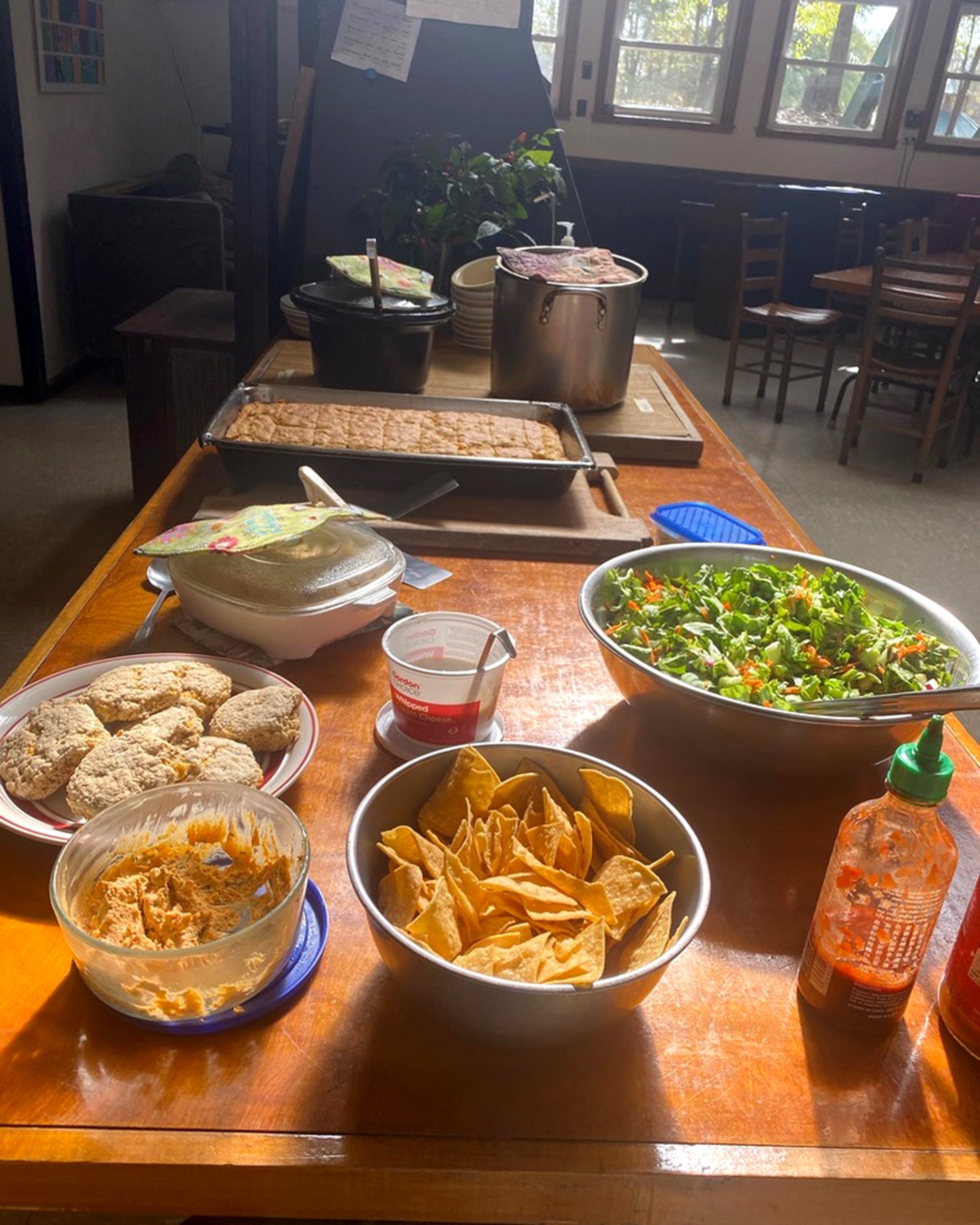The Invisible Network
Joan DeWitt, a member of Abuelas Responden/Grannies Respond, distributes care packages to migrant families arriving at the Greyhound Station in downtown Atlanta, Georgia, on Saturday, March 4, 2023. Photo by Bita Honarvar for palabra
Overextended volunteers offer a warm welcome and friendly faces to asylum seekers after a long treacherous journey. At times, needs outstrip capacity
Words by Allison Salerno, @allisonbsalerno. Photos by Bita Honarvar, @BitaHonarvar.
It’s 6:30 on a Monday morning in November, and like clockwork, Joan DeWitt drives the 20 miles from her senior living community in suburban Atlanta to the downtown Greyhound bus station. She makes this trip three mornings a week, but never sets foot on a bus.
Pulling off the freeway into a neighborhood of bail bonds businesses, the city jail, and the Magic City strip club, DeWitt says a quick prayer. “I just ask the Lord to be with me and to protect me from all adversaries, to help me find a parking space out in front so that I don't have to run all back and forth… and to show courtesy and respect to the people and to be sensitive to the people that really do need my help.”
This bus station sits along one of the many threads of an invisible web of human migration. The interwoven Greyhound routes run from border towns and along major freeways. Volunteers staff bus stations along the way, providing food, short-term housing, clothing, and other necessities to thousands of migrants. But the combined pressure of the pandemic, changes to federal law, and human rights crises around the world—particularly in Venezuela—have stretched that makeshift support system to its limits.
Volunteers like Joan DeWitt, a retired nurse, can be a lifeline for asylum seekers helping them to connect with legal services or mental health support. Photo by Bita Honarvar for palabra
A SOLITARY GREETER IN ATLANTA
By the time DeWitt arrives, the sun has risen. A whir of energy that belies her nearly 80 years, DeWitt first heads to the outside of the station, greeting the cab drivers by name, the local regulars who are unhoused, and the morning security guard. But the people she's really here to see are asylum seekers and other immigrants who’ve been sleeping on the bus station floor all night. DeWitt delivers snacks, sanitary napkins, bottled water, and other necessities to dozens of exhausted individuals and families waiting for their next ride, to anywhere but here.
Many of the migrants heading to Georgia have already walked 2,500 miles, fleeing political persecution and economic collapse in Venezuela. At the Texas border, nonprofits gave many of them free bus passes to Atlanta and other cities across the U.S. Some spent time in immigration detention prisons, while others checked in with government officials to claim asylum. Many simply just walked across the border without notifying authorities. When not in custody, their nightly shelter has been either a red-eye bus ride, or a bus station floor.
Once DeWitt has done her rounds, she heads back to her car to grab more bags, then she meets the 7:25 a.m. bus from Houston, loaded with migrants seeking safety. The retired nurse calls out "Comida gratis" in her "Greyhound Spanish" to passengers emerging from the 18-hour ride. For these recent migrants, volunteers like DeWitt provide temporary housing assistance and referrals for trauma counseling and legal advice. Her group, called Abuelas Responden/Grannies Respond, is in constant contact with other nonprofits throughout Georgia, and in other states.
The constant changes in asylum policy affect the flow of people coming to the stations. Joan DeWitt says she is committed to her volunteer work regardless of the numbers. Photo by Bita Hornavar for palabra
Some bus stations in Texas have been staffed by volunteers helping immigrants for almost a decade. They provided the model for groups like Abuelas Responden/Grannies Respond, which formed in the days following the Trump administration’s May 7, 2018 announcement that it would separate migrants from their children — including those legally requesting asylum in the United States.
DeWitt, a longtime anti-war activist and advocate for the unhoused, flew to Texas in 2018 with a friend for a protest rally in McAllen. That's where protesters became aware, she said, that adults leaving immigration detention were being provided bus tickets from Houston and put on the road without food and clothing. So volunteers along Greyhound routes began communicating with their out-of-state counterparts via text and phone calls about bus schedules and the number of passengers needing help. The organizers, mostly women, provide basics like diapers, water, and sandwiches to asylum seekers and other immigrants enduring days-long rides to their destinations.
Established nonprofit organizations in states like Georgia have struggled to cope with the surging growth of asylum seekers. Exacerbating the crisis, hundreds of thousands of Venezuelans have sought asylum in the United States since last summer from what the United Nations calls “a profound human rights crisis.” More than one in every four Venezuelans have left since 2015, fleeing hyperinflation, violence, and food and medicine shortages stemming from recent years of political turmoil.
Joan DeWitt includes essential items in the care packages she distributes to migrant families. Photo by Bita Honarvar for palabra
Although the Department of Homeland Security has not responded to questions about their dependence on nonprofits to cope with the recent upsurge in border crossings, including Venezuelan asylum seekers, recent federal policies indicate they recognize the essential role non-governmental groups play. The updated DHS Southwest Border Security Plan notes the Federal Emergency Management Agency (FEMA) awarded $225 million last year to a grant program, “that supplements and expands ongoing work of local social service organizations to receive and assist noncitizens released from DHS custody.” And the 2023 Omnibus funding bill directs U.S. Customs and Border Protection to transfer $800 million in funding to FEMA to establish the creation of a new grant program, the Shelter and Services Program (SSP), to support impacted communities.
The current wave of Venezuelans seeking asylum tends to be young, working class people with very limited English language skills and few, if any, social ties to the United States, says Cecilia Menjívar, a professor of sociology at the University of California at Los Angeles. Previous waves of more affluent professionals who flew to South Florida several years ago have been replaced by “recent Venezuelans who are actually more evident of the desperation that is happening,” Menjívar says.
‘We are all trying to figure out how to work together.’
Carolina Ramos, director of advocacy and outreach at the Atlanta-based Latin American Association, said that because Venezuelans are a new immigrant group — with 188,000 arriving in the United States in the U.S. Citizenship and Immigration Services fiscal year ending in Sept. 30, 2022 — they lack the strong social and familial landing pads that other newcomers have. They’ve learned about Georgia, she said, not through personal connections but through social media apps, such as WhatsApp, TikTok, and Facebook. “The network that Venezualans themselves created caused them to migrate here,” says Ramos, whose nonprofit has assisted more than 600 asylum seekers since the summer of 2022 and estimates hundreds more have passed through or settled in Georgia during the same period. The Atlanta Greyhound station is a central hub for the bus company, and rumors swirl that jobs in Georgia are plentiful. “The local, state, and federal governments have made little to no investment to deal with the migration,” Ramos says. “We (nonprofits) are all trying to figure out how to work together.”
The frayed network of volunteers provides advice to Venezuelans amidst a patchwork of ever-shifting federal policies aimed at Venezuelan asylum seekers. In 2020, citing public health concerns during the pandemic, the Trump administration reinstated a 1944 law governing communicable diseases called Title 42. This restricts the entry of migrants from any county into the U.S.’ southern border, including asylum seekers, who have a legal right to seek asylum. The policy has been stopped, restarted, and shifted in size and scope: most recently it was expanded by Biden on October 12, 2022 to include Venezuelans. Up until that date, Venezuelans had been exempt from the policy; the Department of Homeland Security said the change was part of an effort to “create a more orderly and safe process for people fleeing the humanitarian and economic crisis in Venezuela.” The overall human toll of Title 42 is an estimated 2.5 million people who have been expelled at the southern U.S. border under a joint agreement with Mexico.
Then there are the legal battles over the Migrant Protection Protocols aka the “Remain in Mexico” policy, under which asylum seekers have to stay in Mexico until their U.S. immigration court date. “Remain in Mexico” was implemented in the Trump years and is still in effect despite an outcry from human rights advocates who say it violates international law, and a temporary revocation by the U.S. Supreme Court until a federal judge reinstated it in December 2022.
The Department of Homeland Security recently began accepting online applications for a new humanitarian parole process, solely for Cubans, Haitians, Nicaraguans, and Venezuelans. It allows an individual and their immediate family outside the United States to apply to live for two years - with a sponsor - in the U.S. But critics say the program excludes the vast majority of Venezuelan migrants, many of whom are arriving by foot, without passports or social ties, much less a sponsor.
Farewell party for a refugee family from Burma, part of the Karen ethnic group, at Jubilee Partners grounds in 2021. The family is surrounded by long-term partners, residents at Jubilee Partners, and volunteers. Photo courtesy of Jubilee Partners
ONE FAMILY’S JOURNEY
Gabriel and Yolanda, both 26, and their seven-year-old son, are one of thousands of Venezuelan families that passed through the Atlanta bus station in 2022. (The family asked not to use their real names, for safety reasons). In Caracas, Gabriel says he was beaten and incarcerated for protesting the military-backed Nicolás Maduro government.
“They told me not to attend protests anymore or the worst possible outcome would take place,” Gabriel says. “Days earlier to what happened to me, they had begun killing many young people at protests.” United Nations-appointed investigators have found that the grave human rights violations against protestors “amounted to crimes against humanity.”
Seeking a haven, the family walked thousands of miles from Caracas to Texas, where they were apprehended along a dirt road by U.S. Customs and Border Protection agents, and released after two days. In San Antonio, a nonprofit organization gave them bus tickets to Atlanta.
It’s unclear whether the family’s journey would be different now that Title 42 is the law again. In theory, they would have been deported once they encountered Border Patrol. But the reality, says Rachel Bjork, who works with refugees and asylum seekers in Georgia, is what an immigration lawyer in Texas described to her as a “rodeo-like” atmosphere of unpredictable enforcement of federal policies. “The application of Title 42 is not consistent,” she says.
Because the family has no personal connections in the United States and minimal English-speaking skills, they have been relying on the kindness of strangers throughout their journey. They initially ended up at Casa Alterna in Decatur, GA which provides short-term housing for asylum seekers. Since August 2022, the average stay has skyrocketed from 2.5 nights to nearly 50 nights.
‘It's heartening, but we're all scrambling and the need is so great.’
Anton Flores-Maisonet started Casa Alterna in 2006 to serve immigrants from Latin America, including people incarcerated in Stewart Detention Center, a massive private immigration prison in a remote part of Georgia. The arrival of Venezuelan asylum seekers to Georgia in the summer of 2022, however, was “quite distinct from the prior hundreds of individuals that we helped,” he says, because they arrived without sponsors and by bus, often from San Antonio. Flores-Maisonet recently opened a second facility: a seven-bedroom home with housing for up to six months, for up to 14 migrants fleeing violence and political repression.
After two months at Casa Alterna, Gabriel and his family were driven to another stop 90 miles northeast of Atlanta. Jubilee Partners, in the rural town of Comer, has been welcoming refugees since 1980 and can house asylum seekers for longer-term stays. But the family was advised at that point that Georgia was not a good place to apply for asylum, and are currently living in a homeless shelter in Manhattan, awaiting a court date with a federal immigration judge for their asylum claim.
Rachel Bjork, leader at Jubilee Partners. Photo by Allison Salerno
“We try to get them out of Georgia as quickly as possible,” said Bjork, director of Jubilee Partners’ hospitality program. Indeed, statistics compiled by Syracuse University’s Transactional Records Access Clearinghouse (TRAC) of asylum decisions in immigration courts from fiscal year 2017 to 2022 shows that in Atlanta’s two immigration court systems, asylum seekers have a low chance of having their claims accepted. Judges overall denied asylum 94% and almost 90% of the time, respectively, compared to a nationwide denial rate of nearly 64%. In New York, asylum claims were denied just 34% of the time during the same period, and almost 63% of the time for people leaving immigration detention centers. Even within regional immigration courts, “it’s luck of the draw which judge you get,” says Susan Long, co-founder and co-director of TRAC. She notes that asylum seekers can’t necessarily rely on a judge’s individual track record with asylum claims, because the rate also depends on the mix of cases they hear.
Through hundreds of policy changes, the Trump administration gutted asylum protection, says Menjívar. The administration “focused quite a bit on dismantling the mechanisms that allowed people to seek asylum, which contravened international law because the right to seek asylum is enshrined in international conventions,” she added. The system “was not without problems before, especially as the Obama administration went full force on family detention, but the Trump administration exacerbated a trend already in place.”
Food spread at the Jubilee Partners’ shared room, accessible for all residents. Photo by Allison Salerno
MIGRANT NEEDS
Recent federal policy changes seem to be limiting the number of Venezuelan asylum seekers heading to Georgia . DeWitt says that the pre-dawn hours of Jan. 26 was the first time she found no asylum seekers from Venezuela overnighting at the Greyhound station. If the number of asylum seekers continues to dwindle, DeWitt says she might limit her visits to twice a week instead of three times a week. However, she won’t make changes based on fluctuating federal policies. “I’m in it for the long haul,” she says.
Gabriel says he is stunned at the level of care his family received from volunteers. “To have people tell you, ‘We’ll take you to a place to sleep, where you can take a shower, we’ll get you the bus tickets, we’ll take you to a certain place’, that is something you don’t expect, and something we are very grateful for,” he says in a Zoom interview. “How do you repay that?”
‘I do this because it’s in my heart.’
But as the invisible network helps asylum seekers navigate the ever-changing bureaucracy, Bjork says the volunteers and nonprofits are stretched thin.
“It's heartening, but we're all scrambling and the need is so great,” she says. “The networks that we have been relying on for the last couple of years for asylum seekers to receive them, they're just totally tapped out and they don't have capacity.”
At a time when the number of asylum seekers remains robust, the availability of volunteers like DeWitt has declined significantly due to the pandemic. Many are older and have their own health challenges. Since the lifting of pandemic restrictions, few have returned. DeWitt used to make her Greyhound visits with a team of helpers; now she does so alone.
When she finishes the Monday morning run and returns to her condominium community, DeWitt opens the trunk of her Hyundai. She counts what’s left of the coats and shoes, medicine kits with tissues and cough drops, the little boy and little girl kits with cheese sticks and coloring books and fluffy toys. “I always take inventory,” she says.
“I’m not doing this for an audience or approval. I do this because it’s in my heart…. I’ll be back Wednesday.”
—
Editor’s note: Since this story was reported, Joan DeWitt has had to cut back her visits to the station due to management and ownership issues there. DeWitt now is mostly visiting on Saturdays.
Translation provided by Laura Camacho of Athens, Georgia. Names of asylum seekers changed to protect their privacy.
Allison Salerno is an award-winning multimedia journalist based in Athens, Georgia. She’s a seasoned print reporter, who also produces audio stories about farming, food, and social innovation, among other topics. You can find Allison on Facebook, Twitter, and Instagram @allisonbsalerno.
Bita Honarvar is an independent photojournalist and visuals editor based in Atlanta, Georgia. She also works as an image editor at Gravy, a quarterly publication from the Southern Foodways Alliance. There, she primarily commissions original illustrations, and also original photography, to accompany non-fiction stories, essays and poems. Bita spent the early part of her career at The Atlanta Journal-Constitution, where she was a staff photojournalist and photo editor for 16 years. Her work there took her around the United States and abroad, including stints in Afghanistan, Iraq, and Iran. More recently, she was the senior photo editor at Vox.com. She is a member of the National Press Photographers Association and serves on the board of the Atlanta Photojournalism Seminar, the longest continuously-operating photojournalism conference in the U.S.









